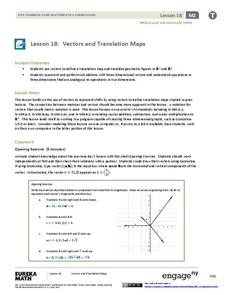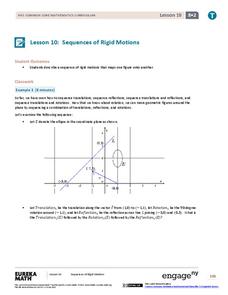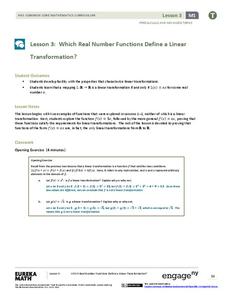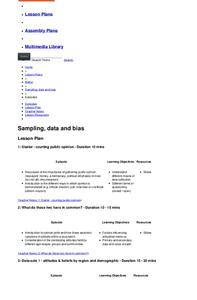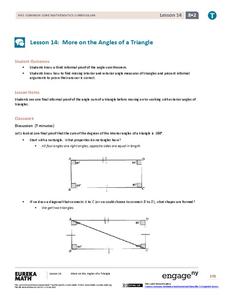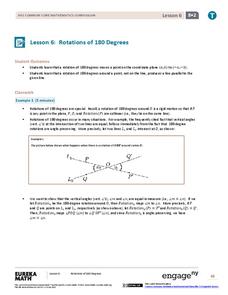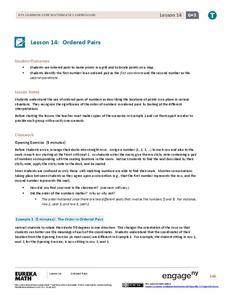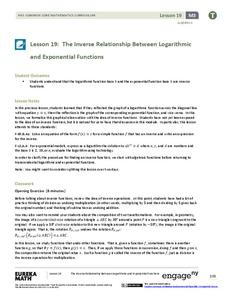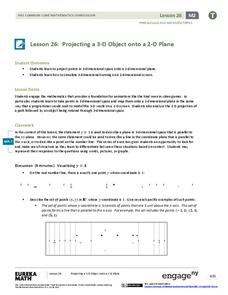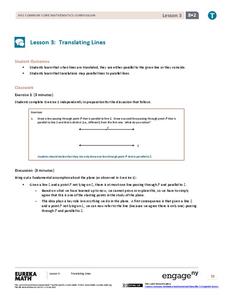EngageNY
How Do Dilations Map Lines, Rays, and Circles?
Applying a learned technique to a new type of problem is an important skill in mathematics. The lesson asks scholars to apply their understanding to analyze dilations of different figures. They make conjectures and conclusions to...
EngageNY
Vectors and Translation Maps
Discover the connection between vectors and translations. Through the activity, learners see the strong relationship between vectors, matrices, and translations. Their inquiries begin in the two-dimensional plane and then progress to the...
Curated OER
The Quirky Quadrilateral
Fourth graders identify and classify different triangles and quadrilaterals. Then they demonstrate an understanding of plane and solid geometric objects and use this knowledge to show relationships and solve specific problems. Students...
EngageNY
Sequences of Rigid Motions
Examine the various rigid transformations and recognize sequences of these transformations. The lesson asks learners to perform sequences of rotations, reflections, and translations. Individuals also describe a sequence that results in...
EngageNY
Definition of Rotation and Basic Properties
Examine the process of rotating images to visualize effects of changes to them. The fifth lesson of 18 prompts pupils to rotate different images to various degrees of rotation. It pays special attention to rotations in multiples of 90...
EngageNY
Definition of Congruence and Some Basic Properties
Build a definition of congruence from an understanding of rigid transformations. The lesson asks pupils to explain congruence through a series of transformations. Properties of congruence emerge as they make comparisons to these...
EngageNY
Which Real Number Functions Define a Linear Transformation?
Not all linear functions are linear transformations, only those that go through the origin. The third lesson in the 32-part unit proves that linear transformations are of the form f(x) = ax. The lesson plan takes another look at examples...
Curated OER
Maps
Students investigate threee types of maps. In this algebra instructional activity, students idenitfy different maps and explore how they relate to the area keeping cllimate and topography in mind. They discuss maps used to navigate...
EngageNY
Informal Proofs of Properties of Dilations
Challenge the class to prove that the dilation properties always hold. The lesson develops an informal proof of the properties of dilations through a discussion. Two of the proofs are verified with each class member performing the...
EngageNY
More on the Angles of a Triangle
Angles and triangles: they're all connected. Uncover the connections between angles in triangles. Scholars learn how to find both exterior and interior angle measures in triangles. The lesson emphasizes the vocabulary related to these...
EngageNY
Sequencing Rotations
Discover the result of a sequence of rotations about different centers. Pupils perform rotations to examine the patterns. They also describe the sequence of rotations that performed to reach a desired result in the ninth installment in a...
EngageNY
Definition of Reflection and Basic Properties
Discover the results of reflecting an image. Learners use transparency paper to manipulate an image using a reflection in this fourth lesson plan of 18. They finish by reflecting various images across both vertical and horizontal lines.
EngageNY
Rotations of 180 Degrees
What happens when rotating an image 180 degrees? The sixth lesson in the series of 18 takes a look at this question. Learners discover the pattern associated with 180-degree rotations. They then use transparency paper to perform the...
EngageNY
Angles Associated with Parallel Lines
Explore angle relationships created by parallel lines and transversals. The 13th lesson plan of 18 prompts scholars use transparency paper to discover angle relationships related to transversals. Learners find out that these angles pairs...
EngageNY
Ordered Pairs
Scholars learn to plot points on the coordinate plane. The lesson introduces the idea that the first coordinate of a coordinate pair represents the horizontal distance and the second coordinate represents the vertical distance.
EngageNY
The Inverse Relationship Between Logarithmic and Exponential Functions
Introducing inverse functions! The 20th installment of a 35-part lesson plan encourages scholars to learn the definition of inverse functions and how to find them. The lesson plan considers all types of functions, not just exponential...
EngageNY
The Geometric Effect of Some Complex Arithmetic 1
Translating complex numbers is as simple as adding 1, 2, 3. In the ninth lesson in a 32-part series, the class takes a deeper look at the geometric effect of adding and subtracting complex numbers. The resource leads pupils into what it...
EngageNY
Getting a Handle on New Transformations 2
Use 2x2 matrices to move along a line. The second day of a two-day lesson is the 28th installment in a 32-part unit. Pupils work together to create and solve systems of equations that will map a transformation to a given...
EngageNY
Graphing Quadratic Functions from Factored Form
How do you graph a quadratic function efficiently? Explore graphing quadratic functions by writing in intercept form with a instructional activity that makes a strong connection to the symmetry of the graph and its key features before...
EngageNY
Composition of Linear Transformations 1
Learners discover that multiplying transformation matrices produces a composition of transformations. Using software, they map the transformations and relate their findings to the matrices.
EngageNY
Projecting a 3-D Object onto a 2-D Plane
Teach how graphic designers can use mathematics to represent three-dimensional movement on a two-dimensional television surface. Pupils use matrices, vectors, and transformations to model rotational movement. Their exploration involves...
EngageNY
Similarity
Use the coordinate plane to show two figures are similar. The lesson incorporates congruence transformations and dilations to move a figure on to another figure. Pupils determine that if a similarity transformation exists...
EngageNY
Definition of Translation and Three Basic Properties
Uncover the properties of translations through this exploratory lesson. Learners apply vectors to describe and verify transformations in the second installment of a series of 18. It provides multiple opportunities to practice this...
EngageNY
Translating Lines
Define parallel lines through transformations. The third lesson of 18 examines the result of the translation of a line. Two possible outcomes include coinciding lines and parallel lines.

